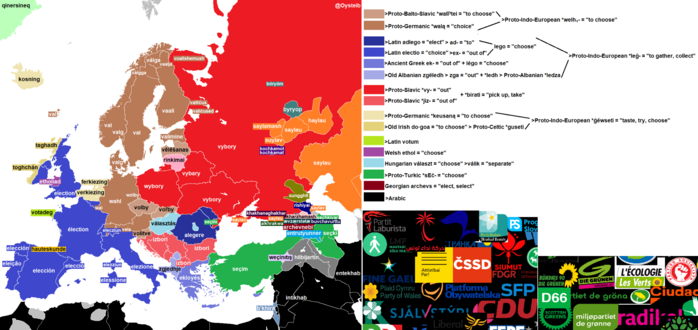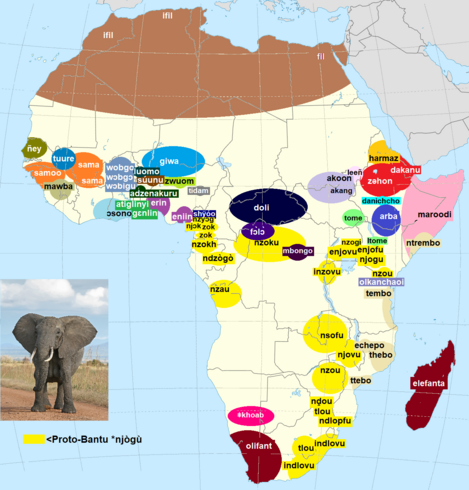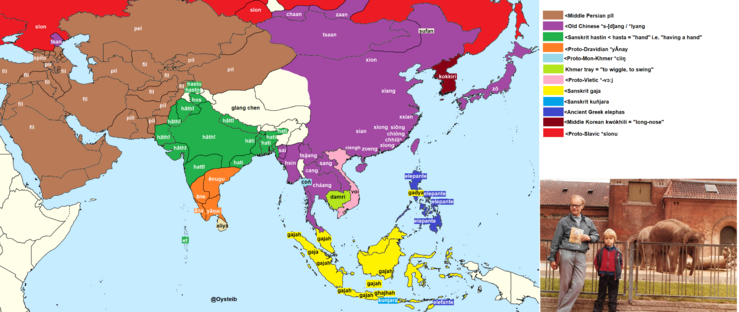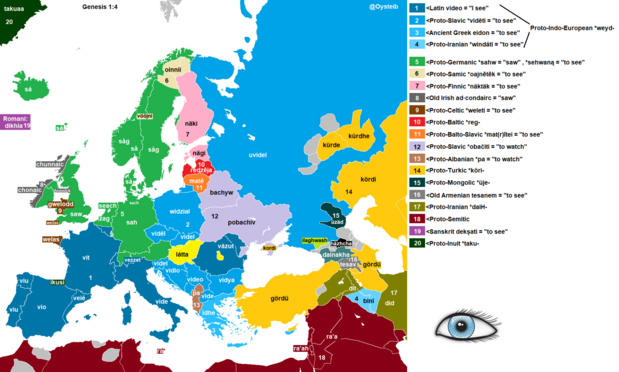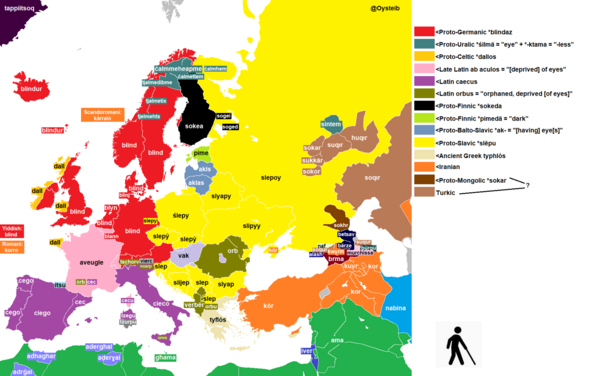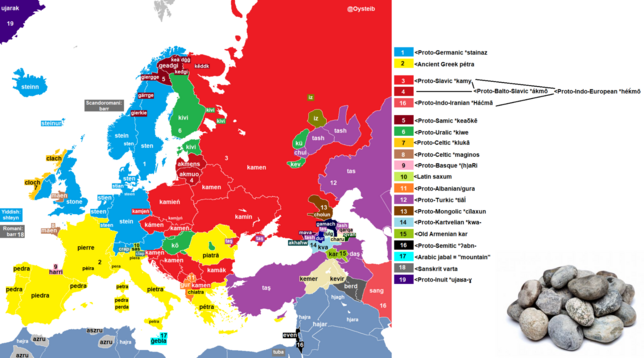Øystein H. Brekke ᚯᛦᛌᛐᛅᛁᚿ ᚼ ᛒ · @oysteib
564 followers · 799 posts · Server masto.aiØystein H. Brekke ᚯᛦᛌᛐᛅᛁᚿ ᚼ ᛒ · @oysteib
548 followers · 776 posts · Server masto.aiThe word for bread in various languages.
Proto-Germanic seems to have had two words for bread, one becoming the present Germanic blue words, the other borrowed into Uralic and Slavic languages and becoming the yellow ones.
One theory is that *braudą was the word for bread with yeast. It is related to the verb "to brew [beer]".
The yellow word survives in English "loaf" and Norwegian "leiv" (piece of bread) and "loff".
#etymologidag #language #languages #linguistics
Øystein H. Brekke ᚯᛦᛌᛐᛅᛁᚿ ᚼ ᛒ · @oysteib
503 followers · 492 posts · Server masto.aiEverybody loves pronouns! Here are the words for "he" and "she" in some languages.
It is quite common for languages to have just one word for English "he" and "she" - these words are marked on the maps with an *
Etymologies get quite complicated with some of these, I don't think there is total agreement about everything among linguists, and Wiktionary sometimes contradicts itself - so, caveat!, there are bound to be mistakes here. #etymologidag #linguistics #language #languages
#etymologidag #linguistics #language #languages
Øystein H. Brekke ᚯᛦᛌᛐᛅᛁᚿ ᚼ ᛒ · @oysteib
500 followers · 485 posts · Server masto.aiThe word for olive in some languages.
The Latin words apparently probably, but not certainly, borrowed from Greek(?)
I've seen other maps dividing Europe into "butter Europe" and "oil Europe" - much the same uses, of course, as seen in the blue languages on this map.
#etymologidag
Øystein H. Brekke ᚯᛦᛌᛐᛅᛁᚿ ᚼ ᛒ · @oysteib
462 followers · 457 posts · Server masto.aiScientific terminology: "Space", as in space-time continuum, in various languages.
As you will no doubt notice, the Germanic languages other than English use the cognate of English "room".
Please fill in the blanks, those who can - particularly for Sami?
#etymologidag #language #languages #linguistics
#etymologidag #language #languages #linguistics
Øystein H. Brekke ᚯᛦᛌᛐᛅᛁᚿ ᚼ ᛒ · @oysteib
450 followers · 452 posts · Server masto.aiThe word for 'cheese' in some languages. Some languages have a more nuanced vocabulary - soft cheeses or things like cottage cheese may have a different word.
One of several cases where Finnic loaned a Germanic word a long time ago and preserves a "fossilized" form, preserving the initial j.
Scandinavian 'ost' is related to English 'juice'. Slavic 'syr' etc. is related to English 'sour'.
#etymologidag #language #languages #linguistics
Øystein H. Brekke ᚯᛦᛌᛐᛅᛁᚿ ᚼ ᛒ · @oysteib
450 followers · 450 posts · Server masto.aiThe word for 'cheese' in some languages. Some languages have a more nuanced vocabulary - soft cheeses or things like cottage cheese may have a different word.
One of several cases where Finnic loaned a Germanic word a long time ago and preserves a "fossilized" form, preserving the initial j.
Scandinavian 'ost' is related to English 'juice'. Slavic 'syr' etc. is related to English 'sour'.
#etymologidag #language #languages #linguistics
Øystein H. Brekke ᚯᛦᛌᛐᛅᛁᚿ ᚼ ᛒ · @oysteib
450 followers · 447 posts · Server masto.aiThe word for 'knife' in some languages. Interestingly, the Germanic word appears in Catalan, from Germanic languages of the early middle ages (Frankish?) - and has at some point been loaned into Basque as well.
I was watching "The Subtle Knife" when I made this - obviously, the name of "Mrs. Coulter" was no coincidence.
Cue puns about Latvian knives now.
#etymologidag #language #languages #linguistics
#etymologidag #language #languages #linguistics
Øystein H. Brekke ᚯᛦᛌᛐᛅᛁᚿ ᚼ ᛒ · @oysteib
440 followers · 425 posts · Server masto.aiThe word for "we" in some languages. (Being Norwegian, I am giving more details of Norwegian dialects than of other languages' dialects.) Now let's see if I can explain this in a way that won't make linguists chew their arms off...:
Pronouns are very basic elements of language, and are very often irregular. Now, in terms of meaning, English "we" and "us" are really the same word - only different grammatical forms... 1/*
#etymologidag #language #languages #linguistics
Øystein H. Brekke ᚯᛦᛌᛐᛅᛁᚿ ᚼ ᛒ · @oysteib
437 followers · 408 posts · Server masto.aiThe elephant trilogy, part three: Africa. This is just glimpses here and there. Languages with millions of speakers are omitted, because I can't find sources online. Still, I think it's a fascinating glimpse, into the enormous variations - and the similiarities: Prominent are the Bantu languages, many of which are here in yellow. They have over 350 million speakers, from Cameroon to South Africa.
#etymologidag #language #languages #linguistics
Øystein H. Brekke ᚯᛦᛌᛐᛅᛁᚿ ᚼ ᛒ · @oysteib
437 followers · 398 posts · Server masto.aiThe word for peacock in some languages. Yes, I know - technically, it's "peafowl" in English, but Wikipedia says "peafowl of either sex are often referred to colloquially as 'peacocks'", and that is my impression too.
There seems to be uncertainty about the origin of the word. Apparently, some - but not all - experts think Latin 'pavo' came from Ancient Greek 'taós', in which case the yellow and red colours are all versions of the same word. #etymologidag #languages #language #linguistics
#etymologidag #languages #language #linguistics
Øystein H. Brekke ᚯᛦᛌᛐᛅᛁᚿ ᚼ ᛒ · @oysteib
430 followers · 377 posts · Server masto.aiThe word for elephant in various languages. In the Philippines, the Spanish word has pretty much replaced the old Malay word (in turn from Sanskrit), apparently. I assume there are no wild elephants in the Philippines?
Three different forms from Sanskrit survive (at least).
#etymologidag #language #languages #linguistics
#etymologidag #language #languages #linguistics
Øystein H. Brekke ᚯᛦᛌᛐᛅᛁᚿ ᚼ ᛒ · @oysteib
429 followers · 366 posts · Server masto.aiAn experiment: My first etymology map of Asia: The number 6.
Disclaimer: I am not a linguist, and I know hardly any of these languages. I made the map to learn. The main sources are Wiktionary and Omniglot. It will certainly contain mistakes - corrections and comments are welcome!
(But read the thread first:)
#etymologidag #language #languages #linguistics
#etymologidag #language #languages #linguistics
Øystein H. Brekke ᚯᛦᛌᛐᛅᛁᚿ ᚼ ᛒ · @oysteib
426 followers · 354 posts · Server masto.aiThe word for "saw", the past tense verb, in some languages. Specifically, the word used in Bible translations in the creation story, "he saw that it was good".
I never tried making a map for a verb before. Verbs are trickier, because they have so many forms. The dictionary form in English and many other languages is the infinitive form - but some languages (e.g. Greek, Bulgarian) don't have infinitive...
#etymologidag
#linguistics
#language
#languages
#etymologidag #linguistics #language #languages
Øystein H. Brekke ᚯᛦᛌᛐᛅᛁᚿ ᚼ ᛒ · @oysteib
425 followers · 350 posts · Server masto.aiThe word for tit in some languages. Oh, grow up, English speakers, the bird!
Which birds are grouped together with a common name varies a lot, and doesnt always overlap with the scientific names. But at least parus major and some poecile species tend to share a name.
Swedish uses 'tita', obviously related to English 'tit' for poecile montanus, (English willow tit/Norwegian granmeis).
#language #languages #linguistics #ornithology
#etymologidag
#language #languages #linguistics #ornithology #etymologidag
Øystein H. Brekke ᚯᛦᛌᛐᛅᛁᚿ ᚼ ᛒ · @oysteib
426 followers · 343 posts · Server masto.aiThe word for "blind" in some languages. This is [I hope] the dictionary form, i.e. most often the masculine form in languages with gender.
Germanic "blind" is related to the verb "blend"/"blande" - the original meaning being something like "murky".
As far as I can tell, the Sami words are direct cognates with Udmurt, originally "eyeless" (correct me if I'm wrong).
This is the first word I've seen where all four Celtic languages have the same word
#etymologidag #linguistics #language #languages
#etymologidag #linguistics #language #languages
Øystein H. Brekke ᚯᛦᛌᛐᛅᛁᚿ ᚼ ᛒ · @oysteib
422 followers · 342 posts · Server masto.aiThe word for "stone" in some languages.
Massive room for misunderstanding here - I am trying for the word for a stone that you can pick up and hold in your hand. And throw the first of, if you are without sin. Not the generic material, which might well be a different word in many languages.
If I missed the mark (I'm sure I must have done for a language or two), comments and corrections are - as always - welcome. #etymologidag
#language #languages #linguistics
#etymologidag #language #languages #linguistics
Øystein H. Brekke ᚯᛦᛌᛐᛅᛁᚿ ᚼ ᛒ · @oysteib
414 followers · 336 posts · Server masto.aiThe word for "apple" in some languages.
In much of Europe, the apple is the archetypal fruit - e.g. the fruit in the story of the Garden of Eden is thought of as an apple, even though the Bible does not say so. Seen here in how the Latin word for fruit has come to mean apple in French and others.
The -ko ending in Slavic languages was originally a diminutive, "little apple".
#etymologidag #language #languages #linguistics
#etymologidag #language #languages #linguistics
Øystein H. Brekke ᚯᛦᛌᛐᛅᛁᚿ ᚼ ᛒ · @oysteib
410 followers · 322 posts · Server masto.aiMilitary edition: The word used for the army rank "lieutenant" in some armies.
"Lieutenant" originally means "placeholder"/"replacement". As Anglophones will know, but maybe not all non-Anglophones, in English it is also used in some non-military settings, like "lieutenant governor", which simply means vice-governor.
The word came to Scandinavia and Eastern Europa via German, which in turn got it from French.
#etymologidag #language #languages #linguistics
#etymologidag #language #languages #linguistics
Øystein H. Brekke ᚯᛦᛌᛐᛅᛁᚿ ᚼ ᛒ · @oysteib
402 followers · 317 posts · Server masto.aiThe word for 'brain' in some languages. Latin 'cerebrum' and its descendants may have the same origin as the Germanic 'hjerne' etc. words, but its unclear to me whether this is universally accepted.
Whereas the Slavic and Iranian words are related to English 'marrow'.
Celtic and Greek going for very logical choices here, I think.
#etymologidag #language #languages #linguistics
#etymologidag #language #languages #linguistics
